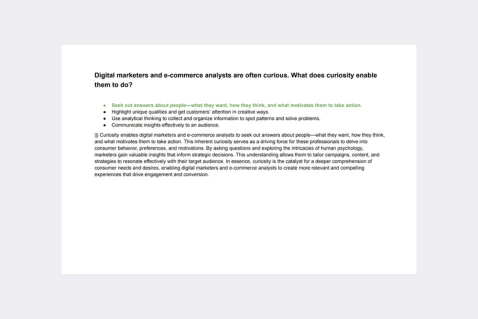As a digital marketer or e-commerce analyst, you often collect and organize information to identify patterns, uncover trends, and solve problems. Which skill does this refer to?
Storytelling
Curiosity
Analytical thinking
Writing
Certification program: 👉 Google Digital Marketing & E-commerce Professional Certificate (Coursera)
Explanation: The skill referred to in collecting and organizing information to identify patterns, uncover trends, and solve problems as a digital marketer or e-commerce analyst is Analytical thinking. Analytical thinking involves the ability to interpret data, discern patterns, and draw meaningful insights from information. In the context of digital marketing and e-commerce analysis, professionals employ analytical thinking to make sense of metrics, user behavior, and campaign performance. This skill enables them to make informed decisions, optimize strategies, and address challenges effectively. Analytical thinking is crucial for interpreting the vast amount of data generated in the digital landscape, allowing marketers and analysts to derive actionable conclusions that contribute to the success of online initiatives.
Passing exams is not a workout. Multiple attempts won’t make you stronger.



- All possible certificate program questions
- Real certification exam questions
- Detailed answer explanations.
- Over 1700 questions, 7 courses, 30 quizzes
- Free lifetime updates.
Unveiling Insights: The Crucial Skill of Data Analysis in Digital Marketing
In the realm of digital marketing and e-commerce, success is often determined by the ability to effectively collect, organize, and analyze vast amounts of data. This process enables marketers and analysts to identify patterns, uncover trends, and ultimately solve complex problems. But what skill lies at the heart of this data-driven endeavor?
The Skill in Question: Data Analysis
Data analysis is the cornerstone skill that empowers digital marketers and e-commerce analysts to extract valuable insights from the wealth of information available to them. It involves the systematic examination of data sets to uncover meaningful patterns, correlations, and trends. By harnessing the power of data analysis, professionals can make informed decisions, optimize strategies, and drive business growth.
Why Data Analysis Matters
In today’s hyper-competitive digital landscape, data analysis is indispensable for several reasons:
-
Insight Generation: Data analysis allows marketers to gain deep insights into customer behavior, preferences, and purchasing patterns. These insights provide the foundation for crafting targeted marketing campaigns and personalized customer experiences.
-
Performance Evaluation: By analyzing key performance metrics such as conversion rates, click-through rates, and customer lifetime value, marketers can assess the effectiveness of their campaigns and initiatives. This data-driven approach enables continuous improvement and optimization.
-
Competitive Advantage: Organizations that leverage data analysis effectively gain a competitive edge by understanding market trends, consumer sentiment, and competitor strategies. This knowledge empowers them to adapt swiftly to changing market dynamics and stay ahead of the competition.
-
Problem Solving: Data analysis enables marketers to identify and address challenges proactively. Whether it’s optimizing website usability, reducing cart abandonment rates, or improving ROI on advertising spend, data-driven insights provide actionable solutions to common e-commerce dilemmas.
Practical Insights for Data Analysis
To excel in data analysis within the digital marketing and e-commerce domain, consider the following practical insights:
-
Define Clear Objectives: Before diving into data analysis, clearly define your objectives and the questions you seek to answer. This ensures focus and helps prioritize data sources and analysis techniques.
-
Choose the Right Tools: Selecting the appropriate data analysis tools and software is crucial. From spreadsheet applications like Excel to advanced analytics platforms like Google Analytics and Tableau, choose tools that align with your needs and skill level.
-
Master Data Visualization: Effective data visualization is key to communicating insights clearly and persuasively. Invest time in mastering visualization techniques to create compelling charts, graphs, and dashboards that tell a coherent story.
-
Stay Agile: The digital landscape evolves rapidly, and so should your approach to data analysis. Embrace agile methodologies, iterate quickly, and remain adaptable to emerging trends and market shifts.
-
Continuous Learning: Data analysis is a dynamic field, constantly evolving with advancements in technology and methodologies. Stay abreast of industry trends, participate in relevant courses and workshops, and engage with communities of practice to enhance your skills continuously.
In conclusion, data analysis is the linchpin skill that empowers digital marketers and e-commerce analysts to navigate the complexities of the modern business landscape. By mastering this skill and applying it effectively, professionals can unlock valuable insights, drive informed decision-making, and achieve sustainable growth in the digital age.
Remember, in the world of digital marketing, data isn’t just information—it’s the fuel that powers success.
Discover our best-value guides
- Special Bundle Offer Google_Ads_Roll
- Special Bundle Offer HubSpot_Exams_Roll
- Special Offer Unchained_Guru_Roll
- Special Bundle Offer Amazon_Roll
- Special Bundle Offer Google_Analytics_Roll
- Special Bundle Offer Google_SkillShop_Roll
- Special Bundle Offer Marketing_Platforms_Roll
- Special Bundle Offer Microsoft_Advertising_Roll
- Special Bundle Offer YouTube_Roll
- Special Bundle Offer Google_Android_Roll
- Ultimate PMP certification preperation guide
- Google Cloud Professional Architect Certification Exam Answers - Ultimate Guide
- Special Bundle Offer SEMrush_Roll